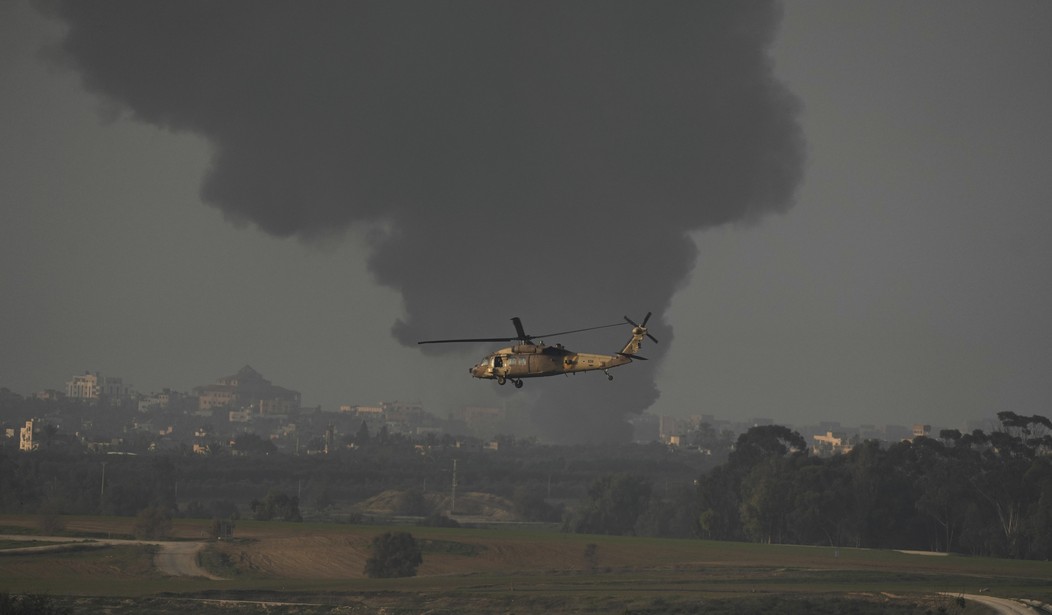Israel and Hezbollah are trading fire along the northern border of Israel on a daily basis, and the government of Prime Minister Benjamin Netanyahu continues to threaten a "major military operation" to reduce the threat.
It's hard to imagine a worse turn of events. Striking Hezbollah means expanding the war with unknown consequences. Will Iran launch a missile barrage against Israeli cities? Will Syria enter the war to support its main ally? What about Iranian proxies all across the Middle East?
The problem with expanding the war is the uncertainty it brings to the calculations of the United States and Israeli governments. And with that uncertainty comes the prospect of the war spinning out of control.
Hezbollah doesn't want an expanded war either. It took the terrorists ten years to recover from the 2006 war with Israel while Lebanon has yet to recover.
Hassan Nasrallah, Hezbollah's cagey old leader, talks a big game. He made a speech this past week threatening Israel with retaliation for the death of Hamas big-wig Saleh al-Arouri.
“We cannot sit quietly in the face of an assassination in the middle of the war, and the assassination will not go unpunished,” Nasrallah said Friday. “The response is coming. The decision has already been made. The matter now depends on what will unfold on the ground and on Allah.”
Hezbollah, a longtime U.S. adversary with well-trained fighters and tens of thousands of missiles and rockets, wants to avoid a major escalation, according to U.S. officials, who say the group’s leader, Hasan Nasrallah, is seeking to steer clear of a wider war. In a speech on Friday, Nasrallah vowed a response to Israeli aggression, while hinting that he might be open to negotiations on border demarcation with Israel.
“Hezbollah can already claim it has liberated the Galilee,” a Beirut-based economist, Nadim Shehadi, told the New York Sun. “Nasrallah doesn’t want war. He’s bluffing. All he wants is the current state of war to continue.”
Nasrallah has built up an impressive arsenal of long-range missiles capable of striking anywhere in Israel. Hezbollah has 150,000 militiamen but only about 15,000 are fully trained. But they are extremely well armed as Israel found much to its chagrin in 2006. They can go toe-to-toe with all but the most highly trained IDF soldiers.
But Nasrallah sees his militia like a new car owner who doesn't want to take his prized possession out of the garage. Hezbollah's militia is a political instrument that Nasrallah uses to maintain control of Lebanon. If he goes to war, it will be a miscalculation on his part.
Or it might be a deliberate escalation by Israel. There is a feeling among some members of Netanyahu's war cabinet that since Israel is already engaged in a war to end Hamas, it should take care of Hezbollah as well.
That's not a good idea, according to the Defense Intelligence Agency analysis just concluded and leaked to the Washington Post.
In private conversations, the administration has warned Israel against a significant escalation in Lebanon. If it were to do so, a new secret assessment from the Defense Intelligence Agency (DIA) found that it will be difficult for Israel Defense Forces (IDF) to succeed because its military assets and resources would be spread too thin given the conflict in Gaza, according to two people familiar with those findings. A spokesperson for the DIA did not offer comment.
The IDF withdrew five brigades from combat in Gaza. Some U.S. officials are worried that the Israeli government could use those brigades for an assault on Hezbollah.
“Hezbollah began firing into Israeli territory, unprovoked, on October 8th and has continued to do so on a daily basis, firing thousands of projectiles. Israel was forced to respond in self-defense,” an Israeli government official told the Post.
“As a result of Hezbollah’s aggression, tens of thousands of Israelis were forced to leave their homes. The state of Israel will not return to the prewar status quo in which Hezbollah poses a direct and immediate military threat to its security along the Israel-Lebanon border,” the official added.
That sounds a lot like the IDF preparing to attack Hezbollah.
One other thing to consider is Netanyahu's growing political troubles. As the errors of the October 7 disaster are coming to light, more and more fingers are being pointed at the prime minister. Netanyahu wouldn't be the first leader to use military action to get himself out of trouble.










Join the conversation as a VIP Member